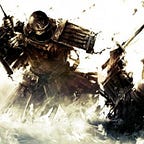Much Learning Does Not Teach Understanding
Ten Thoughts About Education
1. “Much learning does not teach understanding.”
-Heraclitus, On the Universe
2. I have always found a person’s Alma mater to be a better indicator of their ego than their intelligence. In a similar manner, school valedictorians are typically not drivers of change.
3. I think Mark Twain avoided that trap — "I have never let my schooling interfere with my education."
4. Sir Ken Robinson would agree with that sentiment, as is demonstrated in this brilliant video about how our flawed education system is a product of industrial age thinking.
5. Henry Rollins points to experience as key to true education when he says, "You can sit in school all your life, which is cool to do for some years, but then you gotta take that knowledge and go out. Knowledge without mileage = bullshit to me. So you have to take what you know and then go out into what Mark Twain called 'the territory' and break your nose on it."
6. TS Eliot was probably thinking about that kind of understanding when he wrote, "We shall not cease from exploration, and the end of all our exploring will be to arrive where we started and know the place for the first time."
7. Thomas Sowell might have had that idea in mind when he defined the difference between intellect, intelligence, and wisdom:
“The capacity to grasp and manipulate complex ideas is enough to define intellect, but not enough to encompass intelligence, which involves combining intellect with judgment and care in selecting relevant explanatory factors and in establishing empirical tests of any theory that emerges. Intelligence minus judgment equals intellect. Wisdom is the rarest quality of all - the ability to combine intellect, knowledge, experience, and judgment in a way to produce a coherent understanding. Wisdom is the fulfillment of the ancient admonition, ‘With all your getting, get understanding.’ Wisdom requires self-discipline and an understanding of the realities of the world, including the limitations of one's own experience and of reason itself. The opposite of intellect is dullness or slowness, but the opposite of wisdom is foolishness, which is far more dangerous.”
8. Socrates warned against thinking we know more than we do: “I am wiser than this man: neither of us knows anything that is really worth knowing, but he thinks that he has knowledge when he has not, while I, having no knowledge, do not think that I have. I seem, at any rate, to be a little wiser than he is on this point: I do not think that I know what I do not know.”
9. Aristotle identified that man alone is a rational animal. What he meant was that it is the ability to reason that sets us apart from all the other animals. As such, if we do not use this ability, if we do not practice it, refine it, strengthen it, feed it, then are we not, in essence, no better than animals?
10. Taken together, all this implies that education is not something one acquires, but something one does. It is the endless search for wisdom. And it must be endless for as Socrates noted, the unexamined life is not worth living.
